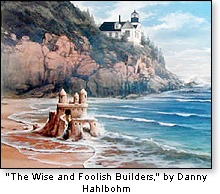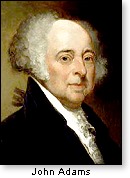Liberal revolution
New and better solutions?
November 2, 2005
RenewAmerica analyst
 There has been an increasing tendency in certain American political circles to emphasize the importance of social programs at the expense of traditional moral standards that have proven their value over time. Often, those who advocate this approach seek to make it seem as if they're creating new solutions. However, the truth of the matter is:
There has been an increasing tendency in certain American political circles to emphasize the importance of social programs at the expense of traditional moral standards that have proven their value over time. Often, those who advocate this approach seek to make it seem as if they're creating new solutions. However, the truth of the matter is:"The eye is not satisfied with seeing, Nor is the ear filled with hearing. That which has been is that which will be, And that which has been done is that which will be done. So there is nothing new under the sun. Is there anything of which one might say, "See this, it is new"? Already it has existed for ages Which were before us. There is no remembrance of earlier things; And also of the later things which will occur, There will be for them no remembrance Among those who will come later still." Eccl. 1:9-11 NASB (emphasis added)
Why is this true?
A nephew of mine came to live with me during his high school years in the early nineties, and he was continually mystified by the fact that I so often knew what he was thinking or planning, before he decided himself or got around to doing it. The reason was, of course, the fact that we have all seen it, heard it, and
Nevertheless, they invariably package the same sin, pin a new label on it, and then convince themselves they've invented something new
By the same token (and in much the same way), liberals in the political arena today are seeking to repackage the same old follies of the past and convince the public they have new solutions. They claim to have ever so much new political wisdom, which is, sad to say, often nothing more than . . .
 The wisdom of a fool
The wisdom of a foolLife is full of players, so it's really hard to know
Just who you truly can believe, and it's best to take it slow.
For many have been led astray by men who've been deceived,
As on their own they build their thrones on the things that they believe.
God's ways are not our ways, but it is the Lord who rules
And to build the house as you see fit is the wisdom of a fool!
One of the most common aspects of immorality is the fact that in spite of the severe consequences historically attached to such behavior, there is always a little voice in the midst of the seduction of future generations that says, "But this result won't happen to you, you will be the exception to the rule." Invariably, something about changing times, improved education, deeper understanding, greater sophistication, and better technology are listed among the reasons why, supposedly, what has always been the result of a departure from sound moral principles and ethical standards attached to them will not occur this time around.
Liberals may try and explain this away. But from the very beginning, faithful adherence to biblical principles was so common in this land it was unquestionably considered by others to be the American way of life. Furthermore, this was the source of strength that enabled thirteen colonies
 This Americans did in winning their independence, for the sake of establishing a nation where freedom in general, and certain individual liberties in particular, were to be defined as inalienable rights
This Americans did in winning their independence, for the sake of establishing a nation where freedom in general, and certain individual liberties in particular, were to be defined as inalienable rightsAs a result of this "Rock"-solid foundation, America went on to become the most powerful and prosperous nation in the world in short order
Within approximately 50 short years after the American founding, an older nation that was traditionally one of the most stable, wealthy, and powerful nations in modern world history
"America is still the place where the Christian religion has kept the greatest real power over men's souls; and nothing better demonstrates how useful and natural it is to man, since the country where it now has the widest sway is both the most enlightened and the freest." [1]
About two decades after de Tocqueville's visit, as a result of a year long study, a Congressional Report in 1853 put forth by a House Judiciary Committee said this:
 Had the people, during the Revolution, had a suspicion of any attempt to war against Christianity, that Revolution would have been strangled in its cradle. At the time of the adoption of the Constitution and the amendments, the universal sentiment was that Christianity should be encouraged, not any one sect. Any attempt to level and discard all religion would have been viewed with universal indignation. The object was not to substitute Judaism or Mohammedanism, or infidelity, but to prevent rivalry among [Christian] sects to the exclusion of others. ...
Had the people, during the Revolution, had a suspicion of any attempt to war against Christianity, that Revolution would have been strangled in its cradle. At the time of the adoption of the Constitution and the amendments, the universal sentiment was that Christianity should be encouraged, not any one sect. Any attempt to level and discard all religion would have been viewed with universal indignation. The object was not to substitute Judaism or Mohammedanism, or infidelity, but to prevent rivalry among [Christian] sects to the exclusion of others. ...It (Christianity) must be considered as the foundation on which the whole structure rests. Laws will not have permanence or power without the sanction of religious sentiment
For over 150 years, biblically-based morals and general ethics springing from the same served America well as a nation. While statistics make it clear that since liberal politicians and political lobbies began seeking to eliminate those things, along with the Christian God Himself in the public domain (at the same time seeking to ban their traditional influence from law and government), this nation has undergone a severe diminution both in terms of stability, and in terms of America's global image and reputation.
Liberals can say what they like, but modern American history is clear proof that when moral standards are sacrificed on the altar of personal and political ambition, the overall impact on a society is increased enervation in areas both political and personal. This results in an increase of instability that is always directly proportional to the degree of the decrease in morality, for that is the only true source of stability and strength in existence. This dramatic degradation of America has been the inevitable result of the fact that sincere recognition of a God who is the source of all truth that sets the standard defining morality and proper living has been cast aside in favor of human wisdom
Nevertheless, even after all this has cost us as a nation to date, liberals are still seeking to ignore the obvious, as they sing yet another verse of their age-old theme song. Seeking to convince the public that by means of increased knowledge, increased medical capabilities, other technological gains and, supposedly, increased enlightenment resulting from all this
They would have us believe that in spite of the massive shifting of values that has taken place, and even an increase of the same in days to come, we may still expect to achieve results which at one time basically everyone in America understood were dependent upon adherence to biblical principles and the blessing of God.
 These are the words of our second American president, John Adams:
These are the words of our second American president, John Adams:"My opinion of the Duties of Religion and Morality, comprehends a very extensive Connection with society at large, and the great Interest of the public. Does not natural Morality, and much more Christian Benevolence, make it our indispensable Duty to lay ourselves out, to serve our fellow Creatures to the Utmost of our Power, in promoting and supporting those great Political systems, and general Regulations upon which the happiness of Multitudes depends.
The Benevolence, Charity, Capacity and Industry which exerted in private Life, would make a family, a parish or a Town Happy. Employed upon larger Scale, in Support of the great Principles of Virtue and Freedom of political Regulations, might secure whole Nations and Generations from Misery, Want and Contempt. Public Virtues, and political Qualities therefore should be incessantly cherished in our Children." [3]
Now I ask you
Another age
The election of Thomas Jefferson as President of the United States came at a time of political upheaval in this nation over the degree to which religion (Christianity) should be allowed to influence American government. It was a time very similar to what we are dealing with politically speaking today, in some ways. Bitter battles were being fought between members of Jefferson's more secularized Republican Party and Federalists who were backed by the New England clergy both before and after the election. In the title for chapter six of his highly celebrated book Separation of Church and State, Philip Hamburger, John P. Wilson Professor of Law at University of Chicago, described the Republican Party's approach to politics during this period of American history as keeping religion out of politics and making politics religious.
I thought of this shortly after the 2004 elections, when in a televised interview I heard newly elected Illinois Senator Barack Obama respond to questions about morality in the Democratic Party by asserting that rising unemployment and lack of national healthcare coverage are examples of America's most serious moral problems. Nearly all of the Democratic Party on a congressional level today has lost touch with their moral compass so badly that when someone tries to connect with them about the matter, either they can't even manage to get on the same page, or they feign a morality their voting records clearly deny. Yet they would have us believe they have solutions to the crises involving societal problems in America that are so unquestionably linked to our moral posture as a nation.
Liberal forces in the government today are relentlessly seeking to diminish the influence of the Christian clergy on the politics of this nation. They have even gone so far as to use the IRS in an effort to remove the influence of the clergy from the picture altogether during the final stretch of the campaign season before elections. They are also seeking the progressive removal
In one Ten Commandments case that I read of in the past year or so, there was a battle over removal of a display of the commandments on private property on the basis of the fact that it could be seen from a freeway. In 1990 the Supreme Court ruled it unconstitutional for a public cemetery to have a planter in the shape of a cross, on the basis of the premise that if someone were to view the cross, it could cause "emotional distress" and thus constitute an "injury-in-fact." [4]
During the first decade of the nineteenth century, Jeffersonian Republicans virtually demanded that clergymen separate religion from politics completely. Yet at the same time, Republicans spoke of their programs and aspirations in ways that described themselves as the heralds of a new millennial era, and even went so far as to employ concepts and terminology pilfered from religious thought. In the words of Professor Hamburger:
 They sought to transform the politics of this world, and in so doing they often described secular politics as a means of achieving religious and even millennial ends. In this civic appropriation of religious expectations, Republicans learned much from writings associated with the French Revolution, most notably the voluble eloquence of Volney and Paine. Thomas Paine
They sought to transform the politics of this world, and in so doing they often described secular politics as a means of achieving religious and even millennial ends. In this civic appropriation of religious expectations, Republicans learned much from writings associated with the French Revolution, most notably the voluble eloquence of Volney and Paine. Thomas Paine-
It was, however, the Compte de Volney who, both in print and in person, gave Americans their most popular glimpse of a Republican millennium. In 1791, in a surreal fantasy of rational, anticlerical, and antimonarchical legislators (whom he imagined himself to be viewing from the gondola of a hot-air balloon) Volney predicted an end to prejudice and passion, warfare and intolerance. Among the rational people of his reconstructed world, the "religion of errour and delusion" would be replaced by the "religion of evidence and truth," leading to unanimity in the perception of the laws of nature, which, in turn, would permit the attainment of harmony on earth. [6]
Liberals today promote the doctrine of the sufficiency of mankind to solve our own problems without a need for biblical restraints as guidelines for our conduct, or as a foundation for law and government. They assert that by means of human intellect and reason alone, we are capable of forming programs that will solve problems created by many years in defiance of sound morals, and of principles based on the same in the administration of law and government.
 If a patient is brought into a hospital ER suffering from arsenic poisoning, how likely is it that the remedy will be more and stronger doses of arsenic? Nevertheless, this is basically what liberal politicians advocate today in terms of solutions to many of our more serious societal problems. Objective examination of what has transpired in American society over the past 30–40 years makes it impossible to ignore some things.
If a patient is brought into a hospital ER suffering from arsenic poisoning, how likely is it that the remedy will be more and stronger doses of arsenic? Nevertheless, this is basically what liberal politicians advocate today in terms of solutions to many of our more serious societal problems. Objective examination of what has transpired in American society over the past 30–40 years makes it impossible to ignore some things.The fact is that, during this time period, we as a nation have been heading down a path of self destruction
Therefore it is safe to conclude that unprecedented changes in American law amounting to the gradual and systematic removal of the Christian influence in this nation, and thus of the moral and ethical restraints I speak of, are at the root of many of our problems. Anyone who strongly denies this is capable of arguing with a mileage sign on a freeway if they're displeased with the information displayed on it.
In 1796 in New York, in an "Oration on the influence of Social Institutions," Tunis Wortman argued that human character is capable of such great advances as to justify hopes for secular perfection. This he did on the basis of advancements in science, as well as in the arts and human knowledge. Wortman asserted that humanity had already achieved a degree of perfection that people of other periods in history would never have imagined to have been possible.
Wortman concluded that little by little, humanity will reach a place where we will need very little government and will go on to the "ultimate state of perfection of human character possible"
In the midst of this fantasy-based political and societal daydream, Wortman concluded that the problems of the past were due to the "monkish and dishonorable doctrine which teaches the original depravity of mankind," which Wortman assured was a "false and pernicious libel upon our species." He blamed the "former union between church and state" for past difficulties, but in exultation over the future he exclaimed, "Heaven be praised!"
Wortman was certain that with the advent of liberal political philosophy, man would continue to advance in wisdom and virtue until misery and vice were vanquished, and the human race had reached a state where "Mind hath become omnipotent over matter." [7]
It would seem that what we call a Democrat today was then more widely known as a Republican.
Nevertheless, it's still the same old song
 Regardless of how it is packaged to give an appearance of being something new
Regardless of how it is packaged to give an appearance of being something newThe real question that remains to be answered is this:
Exactly Who and What are they suggesting that we worship now?
You do realize that virtually everyone worships something or someone
Secular humanism has been defined by the courts as a religion
In the minds of liberal demagogues today that would, of course, be the Democratic Party.
But it will never be so stated; the deception is very similar to that which was employed in the Garden of Eden by the serpent. Democrats say things that are tantamount to declaring that if people ignore Divine instruction and the natural consequences of doing so
It wasn't true then, and it isn't true now.
May God be with you all.
NOTES:
[2] Reports of the Committees of the House of Representatives Made During the First Session of the Thirty-Third Congress
Washington: A. O. P. Nicholson, pp. 1, 6, 8, 9
Washington: A. O. P. Nicholson, pp. 1, 6, 8, 9
[3] The Letters of John and Abigail Adams
John to Abigail, October 29, 1775
© Frank Shuffleton 2004
Penguin Books Ltd. London, p. 117
John to Abigail, October 29, 1775
© Frank Shuffleton 2004
Penguin Books Ltd. London, p. 117
[4] Warsaw v. Tehachapi CV F-90-404 EDP (U.S.D.C., E.D. Ca. 1990)
[5] Paine: Collected Writings
Age of Reason
Literary Classics of the United States Inc., New York
Library of America, 1995, p. 667
Age of Reason
Literary Classics of the United States Inc., New York
Library of America, 1995, p. 667
[6] Separation of Church and State
Philip Hamburger
Harvard University Press, Cambridge, p. 134
© 2002 by the President and Fellows of Harvard College
Philip Hamburger
Harvard University Press, Cambridge, p. 134
© 2002 by the President and Fellows of Harvard College
[7] Ibid., p. 136
© 2005
|
|
